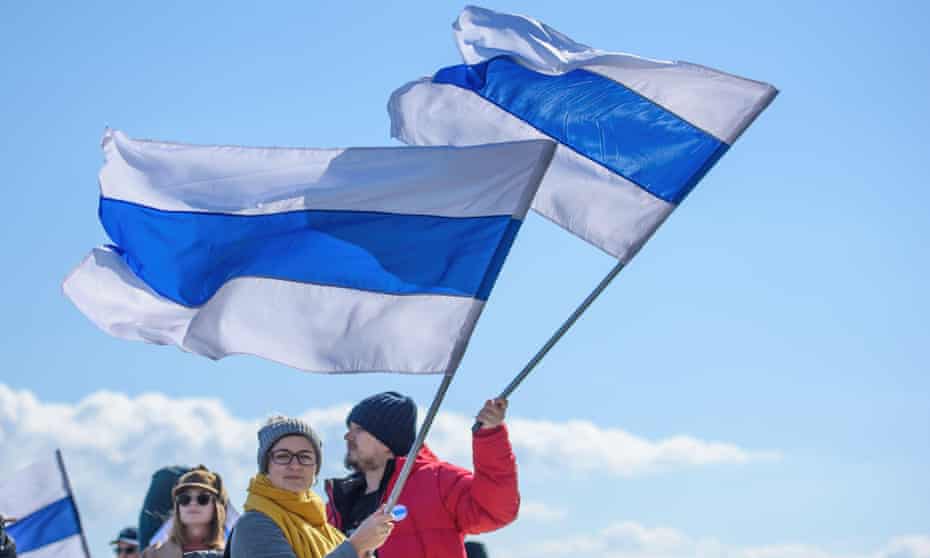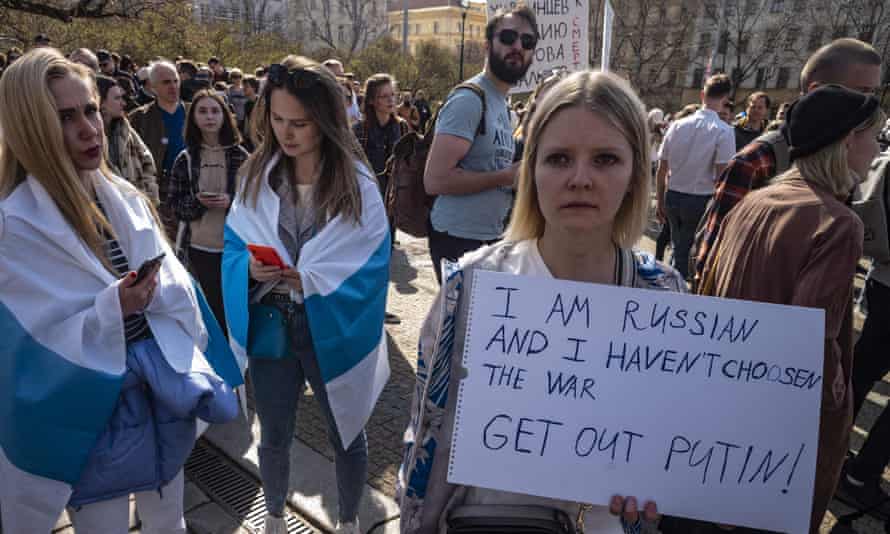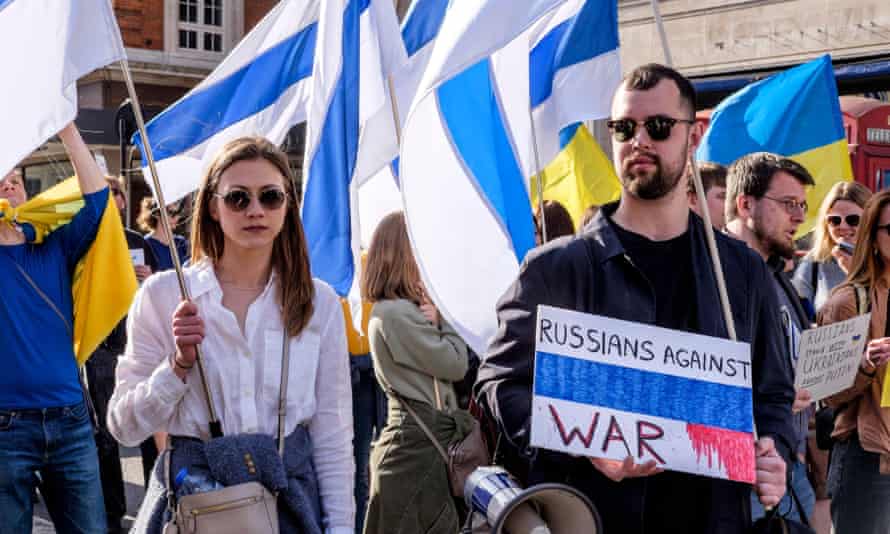Red is dead: Russian anti-war protesters fly a new flag for peace
Red is dead: Russian anti-war protesters fly a new flag for peace
Seeing the tricolour as tainted, they took the ‘blood’ out to leave blue and white, then found others had done so too
Russia-Ukraine war: latest developments

Sun 3 Apr 2022 07.00 BST
When Putin’s forces invaded Ukraine, anti-war Russians such as Kai Katonina, a 31-year-old designer who lives in Berlin, joined protests around the world. Katonina held up a sign that read “No to war”, but few in the crowd knew that they (Katonina’s preferred pronoun) were Russian.
They said: “Onlookers thought we were Ukrainians because our people look the same. It was crucial for us to stand apart and show that Russians also oppose the war. We needed to identify ourselves.”
Katonina said it was obviously impossible to go to the protests with the country’s traditional white, blue and red flag. “Unfortunately, the Russian tricolour has been completely appropriated by the state propaganda and the military,” Katonina said. “We needed a flag that had no connection to violence and war.”
So Katonina and their friends came up with a solution: a white, blue and white striped flag. “It is as if someone threw white paint over the red, over the bloodshed that is going on,” Katonina said.
But they were not the only ones to have the idea – it was soon seen at other protests around the world. “It was funny to see that at the very same time, other Russians opposing the war were putting forward the very same flag. Some unconscious collaboration was going on,” they said.
The flag was originally used in Veliky Novgorod, one of the oldest cities in Russia and known as the cradle of national democracy – its citizens were full participants in representative rule as early as the 12th century.
“The Veliky Novgorod symbolism was important to us. It was as democratic as a place could be in the 12th century,” Katonina said.

Advertisement
The flag has since been embraced on social media as well as by Russian anti-war protesters on the streets.
Russian poets, artists and musicians, as well as Russia’s main opposition movement, led by supporters of jailed Kremlin critic Alexei Navalny, have also backed the use of the flag.
The Free Russia Forum in Vilnius, a leading opposition group outside the country, called the new flag a symbol “of peace and freedom”. The group said: “Why is the new symbol important? Because it frees Russians of their ties to the Kremlin. By showing this flag, we – Russians – can say no to the war, no to dictatorship, and no to censorship. This isn’t the symbol of a state, it’s a symbol of people joining together.”
Katonina said they were also inspired by the events in Belarus, where thousands of protesters used a white-red-white striped flag during rallies after the country’s disputed elections.

This flag, first used during the short-lived Belarusian national republic in 1918, became such an irritant to the regime of President Alexander Lukashenko that even people wearing socks in its colours have faced prosecution.
Advertisement
Unsurprisingly, the new Russian flag has also drawn the ire of the Kremlin, and officials last week proposed banning it as an “extremist” symbol.
Vladimir Putin and state media have sought to create their own pro-war symbols. Most notably, the Latin letter Z has gone from being a military marking to the main sign of public support for Russia’s invasion of Ukraine.
But the new Russian flag has gained more traction among the country’s large émigré communities, which have been swollen by Russians who have left the country since the outbreak of the war.
As Putin is effectively criminalising dissent over the war, tens of thousands of Russians have departed, and the main hubs of organised opposition movements are now abroad. Like-minded Russians have since been gathering at protests and anti-war concerts in cities across Europe, including Istanbul, London, Riga and Warsaw.
At one of those concerts, given recently by the prominent Russian rapper Oxxxymiron, hundreds of Russians came together at the O2 Shepherd’s Bush Empire in London.
“Millions of Russians are against this war,” the rapper said, as he stood over a cheering crowd … some of them waving the new flag.



No comments:
Post a Comment
Note: only a member of this blog may post a comment.